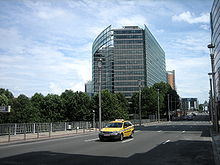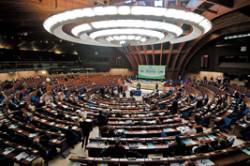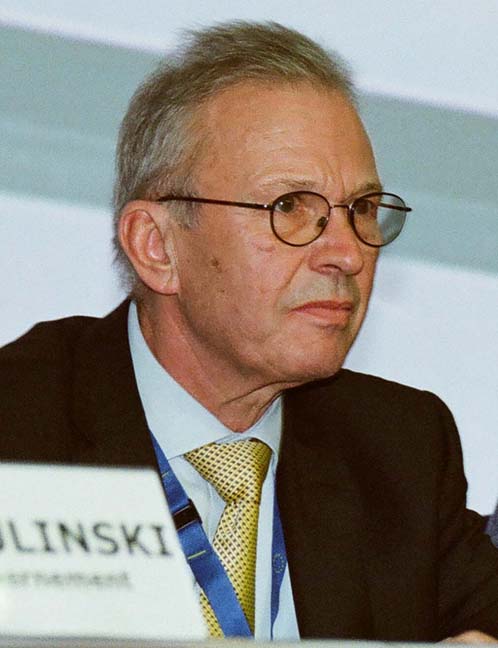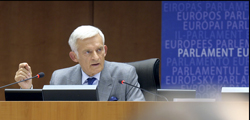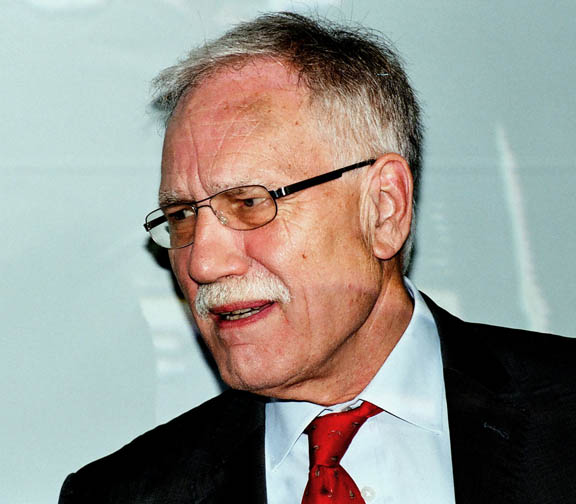 MEP Dominique Riquet: “We will not say yes to a budget that cripples our space programs.” Peter Gutierrez photo.
MEP Dominique Riquet: “We will not say yes to a budget that cripples our space programs.” Peter Gutierrez photo.Although they use a different vocabulary than their U.S. counterparts, European political leaders say that jobs would be the victims at the bottom of their fiscal cliff.
In his keynote speech to the 5th Space Conference on European Space Policy (subtitled “A Global Tool for Global Challenge” held this week in Brussels, European Commission (EC) Vice-President Antonio Tajani underlined the important role of space for restoring economic growth and employment.
Although they use a different vocabulary than their U.S. counterparts, European political leaders say that jobs would be the victims at the bottom of their fiscal cliff.
In his keynote speech to the 5th Space Conference on European Space Policy (subtitled “A Global Tool for Global Challenge” held this week in Brussels, European Commission (EC) Vice-President Antonio Tajani underlined the important role of space for restoring economic growth and employment.
Notably, he called upon the 27 European Union (EU) member-states to mobilize the financial resources required to sustain the Union’s space programs, including Galileo. This appeal, it would seem, is now key. Everyone will know that the European Council has recently been busy thrashing out the latest EU Multi-annual Financial Framework (MFF), that is, the EU budget for the next seven years.
Up until just days ago, EU insiders had continued to express “no trepidation” about the Galileo budget, there being a very strong sense of confidence about high-level commitment to the program.
It may be worth reminding ourselves here just how it all works.
In a nutshell, the EC comes up with a budget proposal, based on estimates gathered from all implicated EU services, programs, and agencies. The European Council, in this case made up of the finance ministers of EU member-states, then considers, examines, negotiates, rehashes, and reworks the proposed budget. The Council then sends this new version to the European Parliament, which can essentially say “yes” or “no.”
If the Parliament says “no,” the whole thing starts over again, which is the ultimate nightmare scenario that everyone wants to avoid.
According to the original Commission proposal, resources needed for Galileo for the 2014–2020 period were estimated at around €7.9 billion (US$10.7 billion). Speaking at the space conference in Brussels, Hervé Jouanjean, director-general of the EC’s Budget Directorate-General, said that amount now looks unlikely to be approved.
“We had hoped for an agreement in November of last year. At that time, we were not far away on spending issues,” Jouanjean said. Unfortunately, last-minute EU budget talks collapsed without any agreement at the close of 2012.
The so-called “stingy states,” said Jouanjean, those that are net contributors to the EU budget and for whom the EU therefore represents a cost, want to see further changes. “They are asking for cuts, ceilings, ‘modernization,’” he said.
As Tajani suggested, the absolute litmus test right now for EU budget expenditures is jobs and growth. All funding must be evaluated as an investment with a real, measurable, and, preferably, short-term pay-off.
MEP (Member, European Parliament) Marian-Jean Marinescu is vice-president and budget point person for the European People’s Party Group, by far the largest political group in the Parliament. He says the EC’s budget proposal has met with fierce opposition within the Council.
“We have explained the position with respect to the division of tasks between the Commission and the European Space Agency [ESA]. The Council is not sure,” Marinescu told his Brussels audience. “We have described in detail for the Council, backed up by the Commission, the ins and outs of the new budget. The Council is not sure. We have tried very hard to explain what it all means, for the economy, for our citizens. The Council is still not sure!”
Visibly frustrated, Marinescu urged conference participants to hold their own national representatives to account. “It all leads me to wonder where the position of the Council is coming from,” he pondered. “The Council is, after all, the Member States, and that means you, us, all of us.”
Will It Be Enough?
If all else fails and no agreement can be reached, the budget for 2014 will be calculated based on the 2013 budget, plus 2 percent. Jouanjean says this would represent a failure, because simply duplicating one year’s budget for the following year does not take into account new needs, new priorities.
“The objective now is to get a ‘reasonable’ agreement,” he insisted. “There must be a way to find an agreement that would allow us to continue with Galileo, Copernicus [the program formerly known as GMES] and the rest of our important R&D programs.”
Standing firm, he concluded, “Whatever happens, we will find a way to keep moving forward. We are now expecting, now hoping for, a Council decision on the budget question next week” [speaking on 29 January 2013].
Volker Liebig, director of ESA’s Earth Observation programs, put it bluntly, “We need what we need.”
He was speaking about Copernicus, but he could have been speaking about Galileo. The argument is the same: “To reap the benefits of this program, we need to demonstrate sustainability. We are ready to go, ready to fly, but we need an operational budget. And make no mistake,” he warned. “We are being watched around the world.”
Investors, Liebig said, are waiting and watching, wondering if Europe’s flagship space programs are ever likely to pay dividends.
MEP Dominique Riquet expressed the Parliament’s convictions about the value of Galileo and other space programs.
“We are very concerned as we watch the prospective budget figures dropping and dropping as Council negotiations drag on,” she said in a plenary address. “But we in the Parliament, I can assure all of you, remain committed to R&D. Within that section of the budget, we find the flagship space programs. We would like to secure these elements within the budget.
“Let us be clear, the Parliament will not accept just any old budget proposal from the Council. We will not say yes to a budget that cripples our space programs.”
For his part, David Parker, chief executive of the fledgling United Kingdom (UK) Space Agency, and as such representing the country widely seen as the main speed bump on the EU budget highway, argued that space activities need not be so dependant on public financing. Stressing flexibility, he pointed out, “ESA has always changed and evolved and it will continue to do so.”
The space sector is about finding solutions, he suggested. “95 percent of space business in the UK is not publicly funded. What we want to do is build non-public spending on space.”
The key for Europe, said Parker, was first knowing what it wants to do. Is it about supporting a core number of big companies that can then compete with each other for European business? Or is it about Europe competing with companies around the world?
He cited regulatory failings. “Virgin Atlantic chose to launch its space tourism business in America, where it found a favorable regulatory environment. Now those pioneering space tourists will fly over Europe, but they won’t be landing here, because we have no regulatory framework for space tourism.”
In a major feat of table turning, Parker concluded his presentation by inviting the EU to join the UK (in space). No one clapped when he finished speaking.
Will they be clapping when the Council returns its budget proposal to Parliament next week? Keep watching this space.

